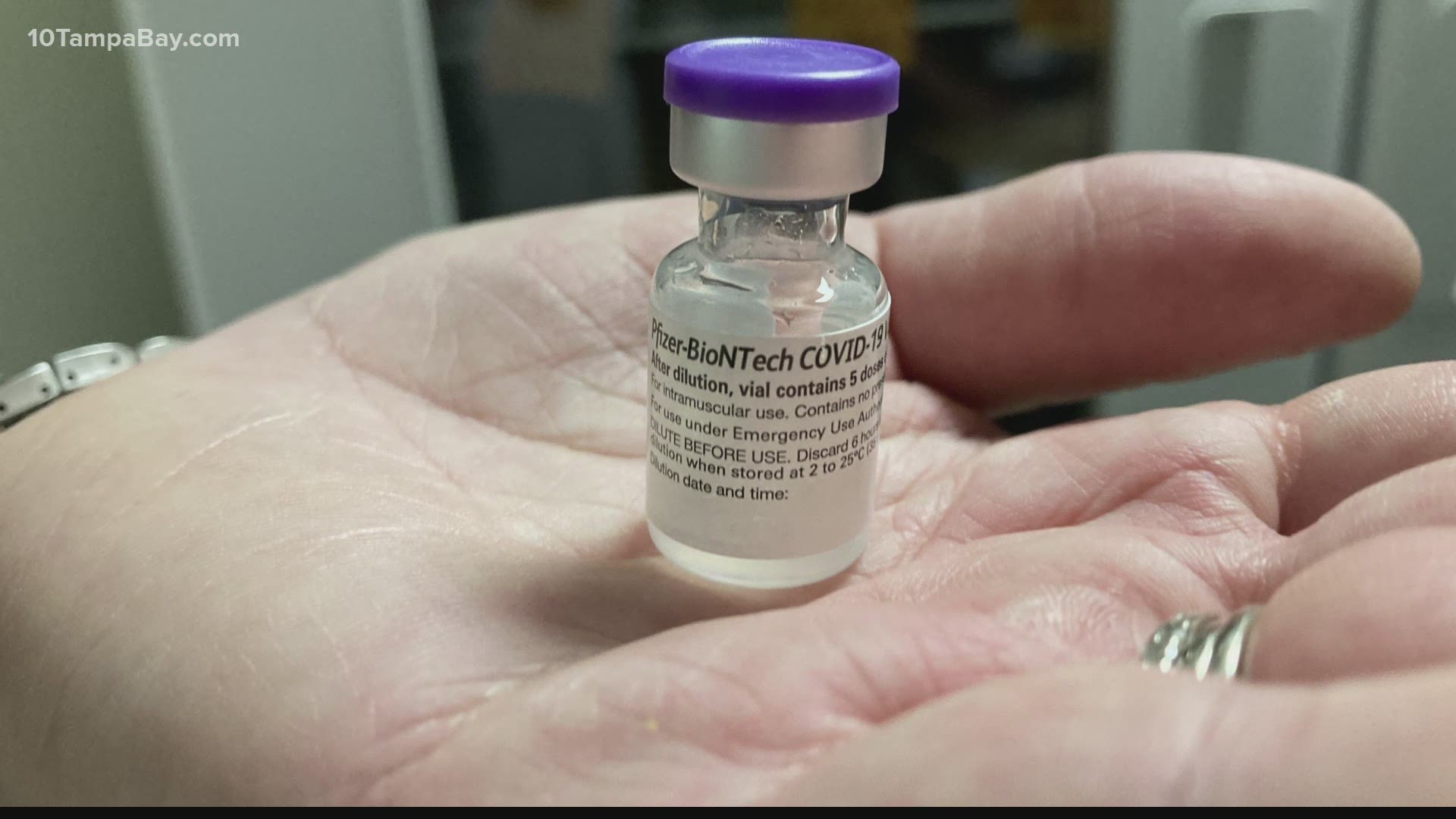TAMPA, Fla. — Our area's most vulnerable citizens are now getting vaccinated against COVID-19, but there are now concerns about future doses of the Pfizer vaccine making it to Florida.
And the state and federal government appear to be at odds over whether or not Florida's allocation of shots has changed.
Initially, Florida was prepared to receive 200,000 doses of the Pfizer vaccine, followed by an additional 250,000 the week after.
Now, it is unclear how many more doses the state will receive before the new year.
During a Dec. 16 press conference, Gov. Ron DeSantis gave an update on his latest communication with Pfizer.
"Then [Pfizer] said you may you have none necessarily, we have production issues, we don't know," DeSantis said.
He went on to explain that there may in fact be some additional Pfizer doses headed to the state next week.
"The system that we use for that, they've actually populated a shipment for next week. We don't think it's going to be quite 200,000. But we're encouraged by that.”
While the state is hopeful for additional vaccine shipments, the current back and forth has raised questions.
But Pfizer said reports of delays or vaccines being on hold is not the case.
“Pfizer has not had any production issues with our COVID-19 vaccine, and no shipments containing the vaccine are on hold or delayed. We are continuing to dispatch our orders to the locations specified by the U.S. government,” the company shared in a statement.
So, diving even deeper, 10 Tampa Bay asked the federal government if there have been any changes and they followed suit with Pfizer.
“Operation Warp Speed allocation numbers locked in with states have not been changed or adjusted. Only three official allocations have been provided to states: Week 1 Pfizer allocations were provided Friday, Nov. 20; week 1 Moderna allocations were provided Friday, Nov. 27; and week 2 Pfizer allocations were provided Tuesday, Dec. 15. Those are the only official allocation numbers that have been provided," a spokesperson with the U.S. Department of Health and Human Services wrote.
HHS reinforced that Operation Warp Speed also remains on track to allocate enough vaccines for about 20 million Americans to receive their first dose by the end of December, pending Moderna's emergency use authorization.
“Reports that jurisdictions’ allocations are being reduced are incorrect. As was done with the initial shipments of Pfizer vaccine, jurisdictions will receive vaccine at different sites over several days. This eases the burden on the jurisdictions and spreads the workload across multiple days. This same process was successfully used for the initial distribution of Pfizer’s vaccine, and we are simply applying lessons learned. Operation Warp Speed is committed to delivering jurisdictions’ allocated vaccines according to their plans safely, quickly and efficiently," the agency continued.
The state has since doubled down on the fact it will be receiving fewer doses than anticipated.
"Initially, the state of Florida was planning to receive approximately 205,000 doses in our week two allocation from Pfizer, as indicated by the federal government. We are now projected to receive 127,000 doses from Pfizer in week two," the Florida Department of Health wrote.
"We look forward to using these doses to vaccinate critical, high-risk populations in Florida and we will continue to work with Pfizer to eradicate COVID-19 and save lives."
It should be noted that the number of 205,000 doses provided in the Department of Health's statement differs from the 250,000 additional vaccines the state originally claimed it was set to recieve. We have reached out to officials for clarity.
Locally, experts say they would be surprised if a change like that was made.
“You know, the way that they've rolled the vaccine out and specifically the populations that they put in Phase 1, if Florida's allocation would go anywhere, it should go up," said Dr. Michael Teng, a virologist with USF Health and Tampa General Hospital.
If there are fewer doses of the vaccine sent to Florida, it would likely mean fewer people get vaccinated in 2020.
"If you delay by two weeks shipments, that means you're going to be less willing to start vaccinating new people because you need to make sure that you have enough doses to vaccinate the people who have already gotten their first dose," Dr. Teng explained. "So it will put a delay in the whole vaccination schedule.”
Something that could speed up the vaccination process is if another vaccine is approved. Moderna went before their review panel Thursday, and Dr. Teng believes their COVID-19 vaccine will be approved before the end of the week.
- Precautionary boil water notice issued for some in northwest Hillsborough County
- Tampa Police detective suspended, charged with 2 counts tampering with evidence
- Mitch McConnell congratulates Joe Biden as president-elect
- Florida will stay open, Gov. DeSantis says, as White House panel urges strict COVID-19 measures
- Florida's Johnson speaking, calling teammates via FaceTime
- Here's where to see Christmas lights around Tampa Bay
►Breaking news and weather alerts: Get the free 10 Tampa Bay app
►Stay In the Know! Sign up now for the Brightside Blend Newsletter

